|
|
|
Sort Order |
|
|
|
Items / Page
|
|
|
|
|
|
|
| Srl | Item |
| 1 |
ID:
142417
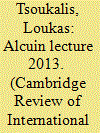

|
|
|
| 2 |
ID:
142422
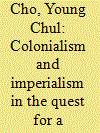

|
|
|
|
|
| Summary/Abstract |
This article aims to conduct a critical appraisal of two major discourses in South Korea on how to construct its national school of international relations (IR) in the global academic field. This article argues that South Korean IR academia's recent quest for an independent, self-reliant national school of IR with universal applicability still appears to be operating under a colonial mentality, either treating Korea as a mere test bed for mainstream rationalist IR approaches or mimicking the character of hegemonic IR theory, thereby reaffirming it. The normative consequences of seeking to promote a national rival to dominant theorizing provide an interesting case study on the sometimes hidden politics of IR scholarship.
|
|
|
|
|
|
|
|
|
|
|
|
|
|
|
|
| 3 |
ID:
142413
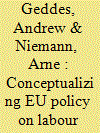

|
|
|
|
|
| Summary/Abstract |
This introduction sets the scene for the articles in this themed section. The starting point is the relatively recent but important developments that have occurred in the area of EU labour migration such as the 2009 ‘Blue Card’ directive covering highly qualified migrants, the 2011 single-permit directive covering residence and work, and a 2013 directive on seasonal workers. The article specifies the legal, policy and institutional developments in this area and discusses their significance. To facilitate reflection on the effects of these developments, the introduction focuses on underlying behavioural logics—that is, modes of action—that could account for the development of EU competencies and that then emerge as themes within the papers in this themed section. The first is an instrumental logic that focuses on the ways in which key actors pursue their interests.
|
|
|
|
|
|
|
|
|
|
|
|
|
|
|
|
| 4 |
ID:
142415
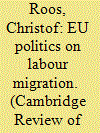

|
|
|
|
|
| Summary/Abstract |
Two European Union (EU) directives on labour migration were adopted in 2009 and 2011. The EU scheme to attract highly qualified migrants, the so-called ‘Blue Card’ directive of 2009, allows member states broad flexibility in implementation. In contrast, the directive on a single permit for migrant workers and their rights of 2011 is far less flexible. It does significantly reduce the scope for derogations at a national level to a minimum. How can this variance in output be explained? Institutional rules are shown to be a key factor. The involvement of the European Parliament as co-legislator alongside the Council limited member states’ influence on legal outputs. The comparison of policy outputs between the two cases points to differences in actor orientations: rather than seeking to increase labour migration into the EU by defining expansive admission conditions, the common EU policy seeks to include migrant workers by defining their rights.
|
|
|
|
|
|
|
|
|
|
|
|
|
|
|
|
| 5 |
ID:
142419


|
|
|
|
|
| Summary/Abstract |
Relations between the European Union (EU) and regional subgroups in Latin America (Mercosur, the Andean Community and Central America) are clear examples of ‘pure interregionalism’ and provide evidence of the EU's active promotion of regional integration. Within the context of these cases, this article explores what type of international power the EU wields, how interregionalism is embedded in that power, and how it is deployed. Combining strands of literature on EU–Latin American relations, interregionalism, EU external policy and power provides a framework within which interregionalism can be understood as an important normative and practical tool for the EU's external power projection. Drawing on official documentation and interviews with key individuals, the paper highlights the EU's articulation of power in interregional relations and reflects upon its mixed success. It concludes that, while imperial qualities and aspirations can be observed in the EU's penchant for interregionalism, the transformative power of the EU remains limited.
|
|
|
|
|
|
|
|
|
|
|
|
|
|
|
|
| 6 |
ID:
142416
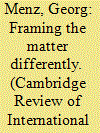

|
|
|
|
|
| Summary/Abstract |
Most of the scholarly literature on European Union immigration policymaking has emphasized the predominance of governmental actors. The major changes entailed in the 2009 Lisbon Treaty, however, imply a significant increase in supranationalism and necessitate rethinking earlier conclusions. Exploring the concomitant rise of policy entrepreneurship traits in the actions taken by the European Commission, this article emphasizes the role of discourse structuration in managing policymaking in a contested and controversial policy domain. The Commission is thus gaining more influence and importance, partially facilitated by institutional changes in the Lisbon Treaty, but mainly due to astute policy entrepreneurship in facilitating consensus. Framing problems in a fashion that maximizes potential agreement by member state governments facilitates political agreement regarding potentially divisive policy proposals. Discursive elements are created and circulated that are designed to appeal, render political implementation at the national level unproblematic and, in some cases, are deliberately bipartisan in nature. Thus, great rhetorical emphasis is placed on linking policy with competitiveness, economic growth and the Europe 2020 agenda to appeal to centre-right concerns, but in the case of temporary migration links are also constructed to centre-left issues, including enhancing migrant rights, avoiding exploitation and creating benefits for sending countries. Empirically, the article focuses on the politics surrounding the genesis of the directive on highly qualified migrant workers (the so-called Blue Card) and the migrant seasonal workers directive.
|
|
|
|
|
|
|
|
|
|
|
|
|
|
|
|
| 7 |
ID:
142425


|
|
|
|
|
| Summary/Abstract |
This article argues that the concept of human dignity is better understood as an essentially contested concept. Following Walter Bryce Gallie's original definition of essential contestability in 1956 and the subsequent additions made by several authors over the years, it argues that describing human dignity in such terms helps to explain not only the theoretical disagreements about the concept, but also its current place within the international legal regime. The essentially contested concept framework is therefore not only accurate in describing the global phenomenon of human dignity (the latter fulfilling the seven criteria set out by Gallie regarding this framework), but also useful in doing so. The article concludes that for human dignity to properly perform its supposed function, it needs to become ‘decontested’, something that can only happen following the recognition of its theoretical structure.
|
|
|
|
|
|
|
|
|
|
|
|
|
|
|
|
| 8 |
ID:
142423


|
|
|
|
|
| Summary/Abstract |
The recent surge of pragmatist scholarship in International Relations emphasizes the need for a shift towards a more practical social science. Abductive reasoning is supposed to serve as one of the tools of such reorientation. This article pays closer attention to this form of inference and shows that it represents our deep trust in the role of error within a scientific enquiry. Although abduction stands for a converse error of affirming the consequent, it also enables us to generate new explanations of many complex problems. Instead of attempting to apply abduction to International Relations as a discipline, we simply show that this inferential practice is already being implemented to a large extent thanks to the agent-based modelling that frequently follows pragmatist tenets. In fact this function of suggesting plausible explanations for further examination in the following stages of scientific enquiry may be easily seen as one of the crucial purposes of this kind of modelling. Three examples illustrate this claim.
|
|
|
|
|
|
|
|
|
|
|
|
|
|
|
|
| 9 |
ID:
142420


|
|
|
|
|
| Summary/Abstract |
This article examines Austria's position as a small, neutral state in the international society as framed by the English School. This examination is chiefly done in the face of the effects of great power conflicts and their impact on Western Europe's society of states. In doing so, the article provides insights to the fundamental puzzles concerning the ways power is managed between states, great and small alike. The article surveys how war (such as in South Ossetia in 2008) and war-like incidents affected Austria's position in the international society and the understanding of its place in great power conflicts between East and West. I argue that neutrality, despite European integration in the context of a peaceful international society, remains a political option for small states such as Austria. This option is especially lively if there is a domestic sentimental attachment to it and sticking to it does not undermine domestic or European and international foreign policy rationale and interests.
|
|
|
|
|
|
|
|
|
|
|
|
|
|
|
|
| 10 |
ID:
142418
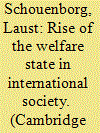

|
|
|
|
|
| Summary/Abstract |
In this article I seek to develop a case for viewing the welfare state as a primary institution in international society. This is with particular reference to Norden (Denmark, Finland, Iceland, Norway and Sweden), where in the course of the 1930s, and particularly in the post-1945 era, the welfare state was elevated to a core principle of legitimacy, largely defining the idea of nationhood for these countries. Furthermore, I will attempt to show how the adoption of this principle of legitimacy conditioned the Nordic countries’ interpretation of a number of other primary institutions in international society such as diplomacy, war and trade. A key contribution of this approach is that it aspires not only to examine the evolution of one institution in isolation, as has often been attempted in English School scholarship, but to actively explore how institutions interact with each other.
|
|
|
|
|
|
|
|
|
|
|
|
|
|
|
|
| 11 |
ID:
142414


|
|
|
|
|
| Summary/Abstract |
Increased interest and debate in Europe and at European Union (EU) level about the potential utility of ‘temporary’ and ‘circular’ forms of migration is accompanied by a certain elusiveness about the meaning of these terms. This elusiveness has actually created some opportunities for interactions at EU level to flesh out the meaning of these terms and inform policy development at member state and EU levels. By focusing on information gathering and the role of knowledge, the article develops a practice-based approach to analyse the relationship between research and policy, the role of the Commission and the activities of European Migration Network (EMN) in the quest for the meaning of temporary and circular migration. Information gathering and knowledge creation at EU level are shown to serve instrumental purposes by informing policy choices (‘evidence-based policymaking’) but it is also shown that existing policy choices cast a long shadow, shaping the context within which knowledge is developed (policy-based evidence-making), while information gathering and knowledge development can legitimate institutional roles, such as the Commission (policy-based institution-building).
|
|
|
|
|
|
|
|
|
|
|
|
|
|
|
|
| 12 |
ID:
142421
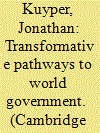

|
|
|
|
|
| Summary/Abstract |
Proposals for world government (WG) have come from a variety of sources including international relations (IR) scholars, economists, normative political theorists and global justice academics. In general, these visions are couched as ideal models to be approximated as closely as possible. The key argument of the article is that, in evaluating the democratic potential of these proposals, we should focus upon the process of designing and building a WG. This is because there is an ineluctable gap between ideal conceptualization and non-ideal realization that emerges through institutionalization. I employ a historical institutionalist lens to describe and problematize potential institutional shifts along a WG pathway. I argue that institutionalizing these ideal visions in our current, non-ideal context would actually exacerbate the democratic deficit. Specifically, building a WG would likely entrench existing inequalities, expand the authority of unaccountable bureaucrats and limit institutional improvements over time. These three points respectively undercut three core values of democratization: equal participation, accountability and institutional revisability. Given this argument, I conclude that an incremental approach—which focuses on advancing values rather than moving towards an ideal model—represents a more productive pathway for global democratization.
|
|
|
|
|
|
|
|
|
|
|
|
|
|
|
|
| 13 |
ID:
142424


|
|
|
|
|
| Summary/Abstract |
The objective of this article is to clarify the significance and usefulness of levels of analysis, a central IR concept, but one often used unproblematically. I argue that a level of analysis should be defined as a social structure that is examined for its effects on another social structure, or on the same social structure. Therefore, levels of analysis are also relational, meaning that one is defined, in part, in terms of its associated unit of analysis. Because this definition conceptualizes levels of analysis as methodological tools rather than ontological postulates, it is consistent with a wide range of positions on the agent-structure debate. More specifically, I show that the methodological issue of which levels of analysis a researcher employs is separate from the ontological issue of whether the theoretical lens is atomistic (reductionist) or holistic at any given level. One implication of this definition is that researchers need not view their ontological commitments as overly methodologically constraining. This article also addresses some questions raised by this conceptualization, among them the possibility of multiple social structures existing at a single level.
|
|
|
|
|
|
|
|
|
|
|
|
|
|
|
|
|
|
|
|
|